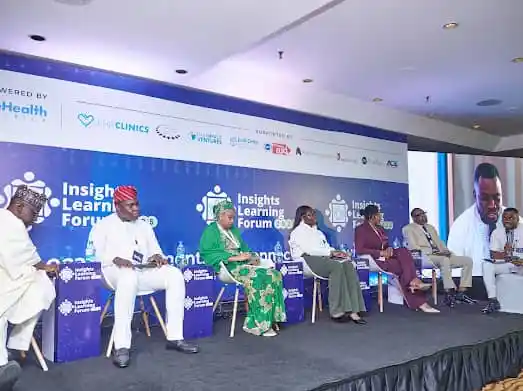
Source: Zainab Adewale

Cross panel session focus on health investment
At the 2025 edition of the Insights Learning Forum (ILF) held in Abuja, Nigerian health and policy experts called on the government to prioritise local partnerships, incentivise private sector innovators, and invest directly in digital health infrastructure—especially at the primary healthcare (PHC) level.
The panel session, titled “Building a Thriving Digital Health Ecosystem Through Local Investment and Partnerships”, brought together a cross-section of thought leaders in digital health, including:
The session was moderated by David Akpan, Deputy Director of Program and Partnerships at eHealth Africa.
Opening the discussion, Mrs. Amina Baloni underscored the importance of aligning digital tools with real-world conditions. She said many PHCs still grapple with inadequate electricity and internet access, making it essential to develop offline-friendly and low-resource-compatible solutions.
“At the PHC level, many facilities don’t even have electricity or internet. There’s a need for developers to create offline-friendly tools that can still function in low-resource settings,” — Amina Baloni
She emphasised co-creation as a non-negotiable part of successful digital health design. Tech developers, she argued, must work with frontline health workers and local communities to ensure their tools meet the actual needs on the ground.
Mrs. Baloni also cited a failed electronic medical records (EMR) project in Kaduna that collapsed due to cost barriers and lack of government support.
Mr. Gafar Alawode stressed that Nigeria’s digital health landscape suffers from weak institutional frameworks, particularly at the state level. Without dedicated units in ministries and health agencies, the ecosystem remains fragmented and under-regulated.
“The government has to say: this is our problem—and then ask for support. Without that clarity, tech companies are solving problems no one has defined,” — Gafar Alawode
He argued for building strong, cross-sectoral coordination between health, ICT, and governance institutions, noting that leadership—not competence—is what’s missing. Nigeria has successfully coordinated health security responses in the past and can replicate such efforts for digital health if the will exists.
Ota Akhigbe of eHealth Africa shifted the focus to the quality of partnerships. She argued that building a digital health ecosystem in Nigeria requires collaborative mindsets over competitive ones, and a shared long-term vision among stakeholders.
“No one can do it alone. We need to come together to complement each other’s strengths,” — Ota Akhigbe
She emphasised that lasting digital health impact must grow from leadership that values synergy over silos, and partnerships that go beyond short-term donor metrics.
As Nigeria faces urgent demands to digitalise its health system amid growing burdens on PHCs, the forum’s message was clear: local solutions must lead the way—but only if the government creates an enabling environment.
Experts called for: